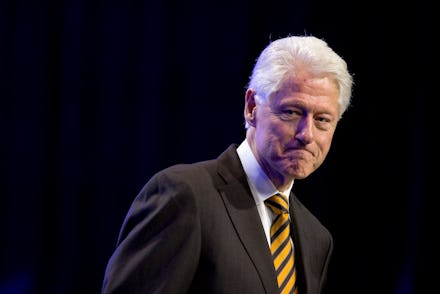Bill Clinton Admits He Made One Huge Mistake During His Presidency

On Wednesday, former president Bill Clinton admitted to making a major error as president. Speaking at the NAACP's annual convention just one day after President Barack Obama delivered a speech calling for comprehensive criminal justice reform, Clinton confessed that his own criminal justice policies had contributed to the very problem that Obama deemed a tremendous force of oppression.
"I signed a bill that made the problem worse. And I want to admit it," Clinton said during his remarks, according to Politico.
Clinton claimed that his major 1994 federal crime bill was a well-meaning attempt to bring down high crime rates, but that it backfired.
"In that bill, there were longer sentences and most of these people are in prison under state law, but the federal law set a trend. And that was overdone, we were wrong about that," Clinton said. "The good news is we had the biggest drop in crime in history... The bad news is we had a lot of people who were essentially locked up who were minor actors for way too long."
Clinton's mea culpa is a yet another sign of the changing times. In the 1990s, Clinton's support for severe sentencing policies was uncontroversial, an expression of a tough-on-crime status quo that prevailed among both Democrats and Republicans. But today, politicians on both sides of the aisle have recognized mass incarceration as an urgent problem.
What did the crime bill do? In 1994, Clinton signed the Violent Crime Control and Law Enforcement Act, which accelerated the country's emergence as the most voracious incarcerator in the world — today the U.S. has 5% of the world's population, but a quarter of its prisoners.
The law put 100,000 new police officers on the streets, funded close to $10 billion in prison construction, expanded the death penalty and created a number incentives for states to impose harsher prison sentences. The policy offered federal money to states for prison construction, but only if they adopted "truth in sentencing" laws that lengthened prison time by reducing or eliminating parole. It included mandatory minimum sentences and the notorious "three strikes" provision, which meant that someone convicted of a violent felony after two previous convictions — which could be drug crimes — was given a life sentence. And it did away with federal Pell grants to assist prisoner education.
Clinton's suggestion that the crime bill was responsible for a historic reduction in crime is also controversial. While there's evidence that incarcerating people who are a threat to society can be effective in making everyone safer, social scientists have not established a strong causal link between mass incarceration and the massive decline in crime. A decline in lead poisoning, aging patterns, changing urban geography, legalized abortion and countless other explanations have been floated as possible factors that contributed to the crime ebb. There's also the fact that most other affluent democracies have managed to maintain lower crime rates than the U.S. without a regime of mass incarceration or invasive policing.
What it means for 2016: Criminal justice reform is a point that Hillary Clinton has decided to make a point of championing in her presidential campaign. Clinton was generally supportive of her husband's policies in the 1990s and called for more prisons and harsher sentences while first lady. But during her current campaign, she has backed the reversal of the policies that her husband was involved in engineering, and has declared it time to "end of the era of mass incarceration."
If Clinton does in fact end up in the White House, one of her most popular mandates may be to make amends for the last time she was there.